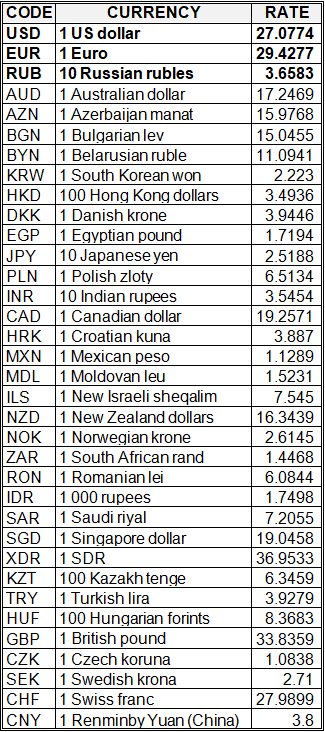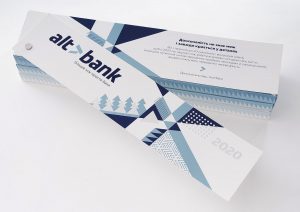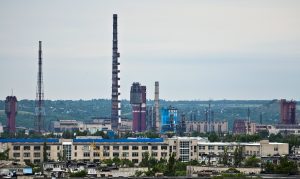National bank of Ukraine’s official rates as of 21/04/20

Source: National Bank of Ukraine

Altbank (Kyiv) shareholders plan to increase charter capital by 32.2%, or UAH 73.2 million, to UAH 301 million due to additional contributions.
According to the bank report on Thursday, April 16, these issues are on the agenda of the general meeting of shareholders scheduled for May 19.
The increase of charter capital is planned by outstanding an additional 366 million shares of the existing par value due to supplementary contributions. Participants in share outstanding can only be the current shareholders of the bank, the bank said in the statement.
Thus, the total number of shares will be 1.5 billion units with a par value of UAH 0.2.
Currently, Altbank’s main shareholders are Serhiy Artiukh (24.592346%), Andriy Dehoda (24.592346%), Leonid Stolnikov (24.592346%), Ihor Volokh (20.070967%) and Oleh Shuptar (6.151992%).
According to the National Bank of Ukraine (NBU), on January 1, 2020 Altbank ranked 52nd in terms of total assets (UAH 1.364 billion) among 75 banks operating in the country.

The use of traffic in the Home Internet network of Kyivstar mobile communications operator during one month of lockdown grew by 20% on average.
The press service of the company said on Friday that the volume of downloaded content currently stands at about 11 GB per day per subscriber, which is 22% more than usual.
According to Kyivstar, subscribers in Poltava, Lviv and Chernivtsi regions consume the most traffic. So, in Poltava region they use a record 15 GB per day per subscriber.
Along with the growth of traffic, the operator also noted an increase in demand for connection from new subscribers. In particular, the number of applications increased by 3% compared to the same period in 2019. The most active growth in new connections is observed in Dnipropetrovsk and Kyiv regions.
During the quarantine, about 4,500 apartments were connected to the Kyivstar Home Internet network.
“To continue providing more than 1 million subscribers with high-quality communication, we had to quickly adapt to work in the new conditions. First of all, we provided our specialists with personal protective equipment, and in the conditions of limiting the work of public transport, organized logistics so that all applications for connections and repairs were carried out on time,” the press service said, citing Head of the Kyivstar fixed-line communications department Serhiy Sukhoruk.
He also said that understanding the importance of the Internet and the possible financial difficulties of subscribers, until the end of quarantine the operator will provide the service even if there are no funds on the subscriber’s account (at a speed of 3 Mbps).

Radiation levels on the territory of the Chornobyl exclusion zone, in Kyiv region and in Kyiv are within the norm, the State Emergency Service of Ukraine has said.
“Radiation levels in the city of Kyiv, in Kyiv region, and in the exclusion zone are within natural background levels,” Director of the State Emergency Service’s Emergency Response Department Volodymyr Demchuk said during an online briefing on Monday.
One of four fire beds has been contained in the Chornobyl zone as of this morning, Demchuk said.
“The most difficult fire bed is located near the village of Rudky, where all possible measures are being taken to prevent the fire from spreading to the territory of the Republic of Belarus,” he said.
The other two fire beds in the exclusion zone, near the village of Rosokhach and Kryva Hora, pose no threat to the forests and other territories in the exclusion zone, Demchuk said.
“The Confinement facility, the spent nuclear fuel storage facility and the other facilities of the state agency managing the exclusion zone are functioning normally, he said.
The Ukrainian State Emergency Service is maintaining contact with the Belarusian Emergency Situations Ministry as concerns joint firefighting measures, Demchuk said.

PrJSC Severodonetsk Azot, part of Dmytro Firtash’s Group DF nitrogen business, increased the production of mineral fertilizers 7.3 times in January-March 2020 compared to the same period in 2019, to 180,210 tonnes, the enterprise said in a press release. During the period, the production of ammonia nitrate amounted to 141,610 tonnes (6.3 times more), carbamide amounted to 32,030 tonnes, industrial aqueous ammonia was 2,810 tonnes (5.9 times more), urea-ammonium nitrate (UAN) was 3,760 tonnes (twice as much).
“This year, the enterprise is gradually gathering pace after the restoration of the full production cycle and the start of ammonia production in March. The increase in the production of own ammonia made it possible to raise the production of mineral fertilizers, namely, ammonia nitrate, urea, UAN. Ammonia nitrate together with UAN remain the most demanded products. On the other hand, this year there was low rainfall, little moisture, and we see how demand for aqueous ammonia and urea is increasing,” the company said in the statement, citing chairman of the board Leonid Buhayev.
The company also said it is currently recovering, despite the special working conditions during the period of quarantine measures. All concluded agreements are fully implemented.
PrJSC Severodonetsk Azot is one of the largest Ukrainian chemical enterprises. It has been part of Group DF since 2011. The core business of the enterprise is production of mineral nitrogen fertilizers.